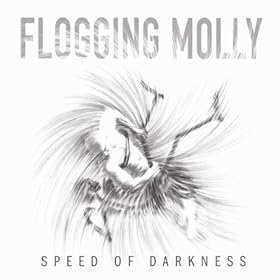 A viable and particularly galvanizing rock subgenre, the Celtic-punk upswing clearly derives from the Pogues, and has almost crossed over into the legitimate mainstream; these days, Boston’s Dropkick Murphys are the clear figureheads for the fusion of energetic punk and traditional Irish drinking songs. Forced to name-drop a second-most-visible representative of this oddly specific style, I’m sure citing Flogging Molly would win you some Family Feud points; after all, their 2002 record Drunken Lullabies might be the closest thing this genre has had in the past couple of decades to a juggernaut, scoring the L.A. band some moderate airplay, and spawning, in the title track, a tenaciously popular karaoke hit. (As a karaoke host himself, the writer of this review is qualified to speak of its popularity; he is not, however, qualified to douchily refer to himself in the third-person anymore.)
A viable and particularly galvanizing rock subgenre, the Celtic-punk upswing clearly derives from the Pogues, and has almost crossed over into the legitimate mainstream; these days, Boston’s Dropkick Murphys are the clear figureheads for the fusion of energetic punk and traditional Irish drinking songs. Forced to name-drop a second-most-visible representative of this oddly specific style, I’m sure citing Flogging Molly would win you some Family Feud points; after all, their 2002 record Drunken Lullabies might be the closest thing this genre has had in the past couple of decades to a juggernaut, scoring the L.A. band some moderate airplay, and spawning, in the title track, a tenaciously popular karaoke hit. (As a karaoke host himself, the writer of this review is qualified to speak of its popularity; he is not, however, qualified to douchily refer to himself in the third-person anymore.)
It’s doubtful that Flogging Molly’s latest, Edge of Darkness, will scale the charts; but people who like Flogging Molly will and should investigate it. This recommendation can only tentatively be expanded beyond those borders, however: yes, there’s a certain level of studio sheen buffed onto these tunes, but Flogging Molly don’t really take large strides to expand their sonic palette. Which is fine, because it’s not really necessary; this genre works because it gleefully clings to convention. The fun is in the energy, and hearing awesome new tunes, and sometimes getting really blasted at a live show.
Musically, there’s nothing here as indelible as Molly’s less-polished studio records; but, unlike the Dropkicks, who seem to thrive a little more on energy and musical dexterity to sound as thrilling as they do, Flogging Molly have always had a way with an indelible vocal melody (see “If I Ever Leave This World Alive” from Drunken Lullabies, which pares the Flogging Molly aesthetic down to a sparse beat, an acoustic guitar, and an aching, soaring vocal performance from lead Molly Dave King), and Edge of Darkness is elbows-deep in earworm hooks. The stomping chorus of first single “Don’t Shut ‘Em Down”, the shouty, extra-punkish “Revolution”, even rousing album closer “Rise Up” (which manages to telegraph its message within, you know, the TITLE – King is nothing if not direct, lyrically speaking) — all these songs boast hooks and melodies worth singing well after they’ve faded. Credit Flogging Molly with catchiness, at least — they wear it so, so well.
Still, there’s a certain degree to which Edge of Darkness doesn’t feel essential. Perhaps its because the very genre is often personified by a certain level of similarity, but then, Edge is often a little more toned down than the average Flogging Molly album. Perhaps that’s it, then; perhaps this is a band so known (and beloved) for their manic punk energy that a more straightforward rock record (albeit one colored with flourishes of traditional Celtic instrumentation, that is) sounds a bit tame. And Edge tackles real-world issues (by which I mean they often talk about factories and the economy), which isn’t necessarily a drawback, but Springsteen perfected working-class recession-rock back in ’78, so I’ll fulfill that side of my musical desires with some Darkness on the Edge of Town.
Still, though, a rabid Springsteen fan must appreciate such blatant homage (seriously, look at the titles… it’s far from a coincidence); and a Flogging Molly fan will similarly appreciate all the hallmarks of their signature sound that FM bring to the table here. Is Edge of Darkness inessential? It absolutely is. But that doesn’t mean it’s not a good time.
Grade: B
